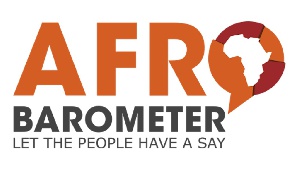In this busy election year, Africans show unwavering commitment to democracy.
Majorities favor elections, media freedom, and presidential terms limits.
A majority of Africans continue to choose democracy over any other form of government, according to Afrobarometer’s latest survey. More than six in 10 of those polled prefer an accountable government to one that “gets things done.”
The leadership of Afrobarometer shared some of these research findings on Wednesday at a press conference that touched on elections, climate change, governance, and economic conditions.
For an audience of journalists, civil society representatives, researchers, and other stakeholders, CEO Joseph Asunka highlighted some of Afrobarometer’s recent milestones, including the adoption of a 10-year strategy for the next five survey rounds.
He noted that Afrobarometer completed surveys in a record 33 African countries in 2022 – more than 40,000 face-to-face interviews with citizens in cities and rural areas across the continent.
On governance, Asunka said the overall picture is encouraging, with widespread popular support for democratic practices. “Across the continent, the good news is Africans are still solidly committed to democracy; that remains the majority view.
They prefer democracy to any other form of government,” Asunka said, adding that a clear majority of Africans remain in favor of elections, parliamentary oversight of the president, media freedom, and limits on presidential tenure.
In 20 countries surveyed in 2021/2022, 67% of respondents expressed a preference for democracy “over any other kind of government,” and large majorities rejected nondemocratic alternatives such as one-man rule (81%).
Participants heard that most Africans describe their economic conditions as bad and give governments poor performance ratings on critical economic issues such as job creation and management of the economy. Unemployment remains the top policy priority cited by Africans, followed closely by the management of the economy.
On climate change, only about half (51%) of citizens say they have heard of the phenomenon. But among those who are aware of climate change, three-fourths (74%) want their governments to take climate action, even at a considerable economic cost.
In its upcoming Round 10 surveys, Afrobarometer will include new modules on sexual and reproductive rights, migration, youth, and access to justice. Other plans include launching capacity-strengthening initiatives for journalists and civil society groups in data analysis and survey research methods.
Emmanuel Gyimah-Boadi, Afrobarometer co-founder and board chair, said these results come at a critical juncture as the continent’s most populous nation, Nigeria, prepares for its presidential election on 25 February. It also coincides with a busy electoral year for the continent. A dozen countries are expected to elect new leaders this year. Afrobarometer, too, finds itself at a pivotal moment in its 24-year history.
“The year 2022 was a remarkable one. Firstly, we surveyed an impressive 33 countries that year, a record-breaking achievement in a single calendar year and the first of its kind in our history,” Gyimah-Boadi said. “Even more important, the demand for our data and analysis from policy and development stakeholders on the continent and abroad surged dramatically.
“As we look ahead, we remain steadfast in our mission to continually share data-driven insights and evidence-based policy options. And we are confident that our efforts will generate tangible outcomes for citizens.”
Director of Surveys Boniface Dulani, Director of Analysis Carolyn Logan, Head of Data Management Jamy Felton, and Capacity Building Manager Dominique Dryding provided expert insights during the in-depth conversation, moderated by Afrobarometer Director of Communications Nafissatou Ndiaye Diouf.
Quotes from panellists
Director of Surveys Boniface Dulani: “For the first time in the history of Afrobarometer, we completed 33 regular-round surveys in one calendar year. That is an average of nearly three surveys a month. This brought our overall total of Round 9 surveys to 37. The 33 surveys completed in 2022 involved more than 40,000 individual interviews with ordinary citizens across the continent.”
Director of Analysis Carolyn Logan: “Afrobarometer’s aim is to reach many diverse audiences with our findings, from ordinary Africans to senior policymakers, journalists, policy advocates, academics, business leaders, and others, so that African voices are heard in policy debates through many different channels.”
About Afrobaromete
Afrobarometer (AB) is a trusted source of high-quality data and analysis on what Africans are thinking. With an unmatched track record of 350,000+ interviews in 39 countries, representing the views of 80% of the African population, AB is leading the charge to bridge the continent’s data gap.
AB data inform many global indices, such as the Ibrahim Index of African Governance, Transparency International’s Global Corruption Barometer, and the World Bank’s Worldwide Governance Indicators. The data are also used for country risk analyses and by credit rating and forecasting agencies such as the Economist Intelligence Unit.
All AB data sets are publicly available on the website and may be analyzed free of charge using AB’s online data analysis tool.
General News of Friday, 24 February 2023
Source: Afrobarometer
Afrobarometer unveils insights on elections, climate change, and governance at press conference
Entertainment
















